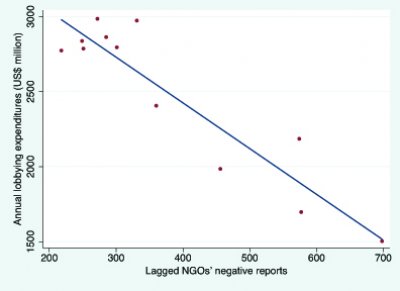Julien Daubanes and Jean-Charles Rochet
Non-governmental organizations (NGOs) frequently oppose corporate practices, even where such practices have been approved by public regulators. These NGOs are consumer associations, environmental groups, and stakeholders’ advocacy groups, and are particularly active in the energy, food, retailing and banking sectors. They often convince firms to “self-regulate” when public regulation seems too lax.
In recent years, many companies have significantly strengthened their social, environmental, and risk criteria following NGO intervention. Endocrine disrupting chemicals (EDCs) are a case in point: although the inaction of public regulators—and the influence of industry—on EDCs are often denounced, NGO pressure has prompted an increasing number of companies to commit to the objective of zero EDCs discharge. NGOs’ rising influence is considered one of the most significant changes in business over the past decades.
To oppose corporate projects and practices they disapprove of, activist NGOs hardly lobby regulators1. Instead, they often use their influence to constrain firms directly by, for example, calling for a boycott, mounting a negative advertisement campaign, and so on.
A fundamental question emerging from this trend is why societies rely on NGO activism when externalities could be resolved at the outset by public regulation. In a recent MIT CEEPR Working Paper, we offer a possible answer. We start with the observation that, since the mid-twentieth century, public regulators have lost public trust. Recent catastrophes, such as the global financial crisis, the explosion of the Deepwater Horizon oil-drilling rig, and the Fukushima disaster, have reinforced this dynamic, raising questions about the independence of the agencies involved.
The paper develops a theory of NGO activism as a response to extensive lobbying by industries. Over the past few decades, the rapid growth of industrial projects’ size and value has increased corporate lobbying and, therefore, the vulnerability of public regulation. In response, activist NGOs have increasingly decided to monitor industrial projects. At the same time, the Internet and associated communication technologies (ICT) have dramatically accelerated the rise of NGOs. There are two important aspects: first, the ICT revolution has led to more information dissemination, enabling NGOs to examine more opaque or complex issues; second, it has greatly improved the ways in which the public can be mobilized through social media, as well as NGOs’ ability to coordinate their efforts through networks.
With increased transparency, NGOs have become more effective at reducing the impact of lobbying and, therefore, the influence of companies. For the period from 2002 to 2014, for example, we find NGO criticism levelled against U.S. industrial sectors has been negatively associated with companies’ subsequent lobbying expenditures (see figure below).
This raises the issue of the legal status of NGO activism, which is ambiguous in most countries because NGO actions, such as calls for boycott, may violate refusal-to-deal, anti-discrimination, and anti-defamation laws. Besides, the legal protection of NGO activism is a more urgent issue for developing countries, in which NGOs are often banned, especially in autocratic governments.

1 Over the period 2002-2014, for example, U.S.-based NGOs’ lobbying expenditures amounted to $2.3 billion, while lobbying expenditures by U.S.-based companies exceeded $36 billion.



